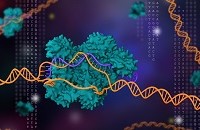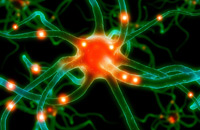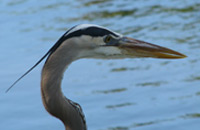Programs of Study
There are two undergraduate degrees offered through the Department of Biology: The B.S. in Biomedical Sciences and the B.S. in Biology. We also offer a new accelerated B.S.-M.S. degree in Biomedical Sciences. Students interested in the B.S. in the Biology degree are required to specify what area of concentration their degree will be in. Currently there are four areas in which students can choose to study. All of the areas of concentration are special designed for students interested in pursuing graduate education or research careers in the specific areas. My Osprey Map is a sequence guide to help students schedule their classes each semester until graduation.
B. S. Biomedical Sciences
 This degree is designed to provide a broad background in biology with a special emphasis on preparing students for careers in the medical and veterinary sciences. The Biomedical Sciences degree provides all the prerequisites for entry in more medical, veterinary, dental, physician's assistant, pharmacy, chiropractic, optometry and podiatric schools.
This degree is designed to provide a broad background in biology with a special emphasis on preparing students for careers in the medical and veterinary sciences. The Biomedical Sciences degree provides all the prerequisites for entry in more medical, veterinary, dental, physician's assistant, pharmacy, chiropractic, optometry and podiatric schools.
Program of Study for Biomedical Sciences concentration
Accelerated BS-MS (ABM) in Biomedical Sciences
 This is a limited admission program for Biology majors in the Biomedical Sciences degree who would like to earn a dual degree in five years. More information is available through the Biology Advisor.
This is a limited admission program for Biology majors in the Biomedical Sciences degree who would like to earn a dual degree in five years. More information is available through the Biology Advisor.
B.S. in Biology: Four Areas of Concentration
 Molecular/Cell Biology and Biotechnology
Molecular/Cell Biology and Biotechnology
This track is designed to provide a broad background in biology with a special emphasis on the inner workings of the cell.
Program of Study for Molecular/Cell Biology and Biotechnology concentration
 Coastal and Marine Biology
Coastal and Marine Biology
This track is designed to provide a broad background with a special emphasis on the biology of coastal and marine organisms and ecosystems.
Program of Study for Coastal and Marine Biology concentration
 Coastal Environmental Science
Coastal Environmental Science
This track is designed to prepare students for entry into positions with government and environmental agencies specializing in environmental work.
Program of Study for Coastal Environmental Science concentration
 Ecology and Evolutionary Biology
Ecology and Evolutionary Biology
This track is designed to provide a broad background in biology with a special emphasis on the ecological and ecology of organisms.
Program of Study for Ecology and Evolutionary Biology concentration
Course Matrix (Updated 2024)
-
Courses offered every semester (fall, spring and summer)
Fall, Spring and Summer Course Number Course Name BSC 1005 Principles of Biology BSC 1010C General Biology 1 BSC 1011C General Biology 2 BSC 2012C General Biology 3 BSC 2085C Anatomy & Physiology 1 BSC 2086C Anatomy & Physiology 2 BSC 3842 Writing & Analytical Skills in Biology BSC 4930 Special Topics in Biology PCB 3023C Molecular & Cellular Biology PCB 3063C Genetics PCB 3063L Genetics Lab PCB 4713C Human Physiology PCB 3043C Ecology MCB 2010C Microbiology MCB 3020C Microbial Biology BSC 4905 Directed Independent Study BSC 3943 Internship in Applied Biology BSC 1005C Principles of Biology BSC 1930 Current Applications BSC 4947 Senior Seminar Practicum -
Courses offered every fall semester
Fall Course Number Course Name BOT 4404C Marine Botany BSC 3052 Conservation Biology BSC 4801C Animal Physiology BSC 2991 Introduction to the Biology Major BSC 4434C Introduction to Bioinformatics BSC 4801C Animal Physiology PCB 4234 Biology of Cancer PCB 4301C Limnology ZOO 3733C Human Structure & Function ZOO 4513/L Animal Behavior/Lab -
Courses offered every spring semester
Spring Course Number Course Name BOT 4503C Plant Anatomy & Physiology BSC 3263 Marine Biology BCH 4024 Molecular Biology & Biochemistry BCH 4024L Molecular Biology & Biochemistry Lab PCB 4233 Immunology MCB 4503 Virology OCE 3008 Oceanography BSC 3057 Introduction to Environmental Studies ZOO 4485/L Biology of Marine Mammals -
Courses offered every fall and spring
Fall & Spring Course Number Course Name BSC4921 Biology Lecture Series PCB 4843 Cell & Molecular Neuroscience -
Courses offered in fall (even years)
Fall - Even Course Number Course Name ZOO 4454C Ichthyology ZOO 4823C Entomology PCB 4067 Molecular Basis of Inheritance BSC 4054C Environmental Toxicology MCB 4021C Molecular Techniques -
Courses offered in fall (odd years)
Fall - Odd Course Number Course Name BSC 4022 Biology of Aging MCB 4203 Pathogenic Bacteriology PCB 4253C Developmental Biology PCB 4805 Endocrinology ZOO 4462C Herpetology ZOO 4753 Histology -
Courses offered in spring (even years)
Spring - Even Course Number Course Name ZOO 3713C Comparative Vertebrate Anatomy FAS 4354 Coastal Fisheries Management PCB 4674 Evolution PCB 4707 Human Physiology in Extreme Environments -
Courses offered in spring (odd years)
Spring - Odd Course Number Course Name ZOO 4208C Coastal Invertebrate Zoology ZOO 4407 Biology of Sharks and Rays -
Courses offered every summer
Summer Course Number Course Name BCH 4024 Molecular Biology & Biochemistry (Lecture only) ZOO 4559L Shark Ecology ZOO 4551C Dolphin Behavioral Ecology
Important Academic Information
Selective Admission Process
Students who plan to major in biology will need to have taken the following courses with a minimum 2 B's and 2 C's combination before being admitted to the program:
Selective Admission Requirements:
- General Biology 1 and lab (BSC 1010C)
- General Biology 2 and lab (BSC 1011C)
- General Chemistry 1 and lab (CHM 2045C)
- General Chemistry 2 and lab (CHM 2046C)
Transfer students with 60 credit hours who have met at least two of the selective admission requirements will be provisionally admitted to the major. Students admitted provisionally will have three semesters to complete the selective admission requirements or will need to choose a different major.
Biology Major Retention Policy
After students are accepted as majors within the biology department, students will have to show adequate progress within the discipline. To remain in good standing as a major you are only permitted two attempts for any one biology course. Withdrawing from a class or making a grade lower than a C will count as one attempt. On the second attempt a biology major will have to make a C in the course. This policy does not apply to chemistry or physics courses which are required for the major.
Honors in the Major in Biology
Requirements
Requirements for admission to Honors in the Major in Biology are:
- Completion of at least 60 credit hours of college credit including at least 12 graded upper-division hours at the University of North Florida;
- At least 3.5 GPA within the major and at least 3.2 GPA in all upper-division courses regardless of Institution;
- Students must provide the Department of Biology Chairperson with a letter of support from their potential mentor in order to have approval for admission.
Honors in the Major in Biology is awarded upon completion of a research proposal, an advanced Honors Thesis, and at least two semesters of Direct Independent Study course work as determined by the student's honors thesis advisor. In addition, students are required to present their research findings at the annual UNF SOARS conference or appropriate venue (i.e. local, regional or national conference). Students must also maintain the 3.5 GPA within the major and 3.2 overall upper-division GPA.
The honors thesis will be signed off by the mentor, Chair of the department and Dean of Undergraduate studies.
